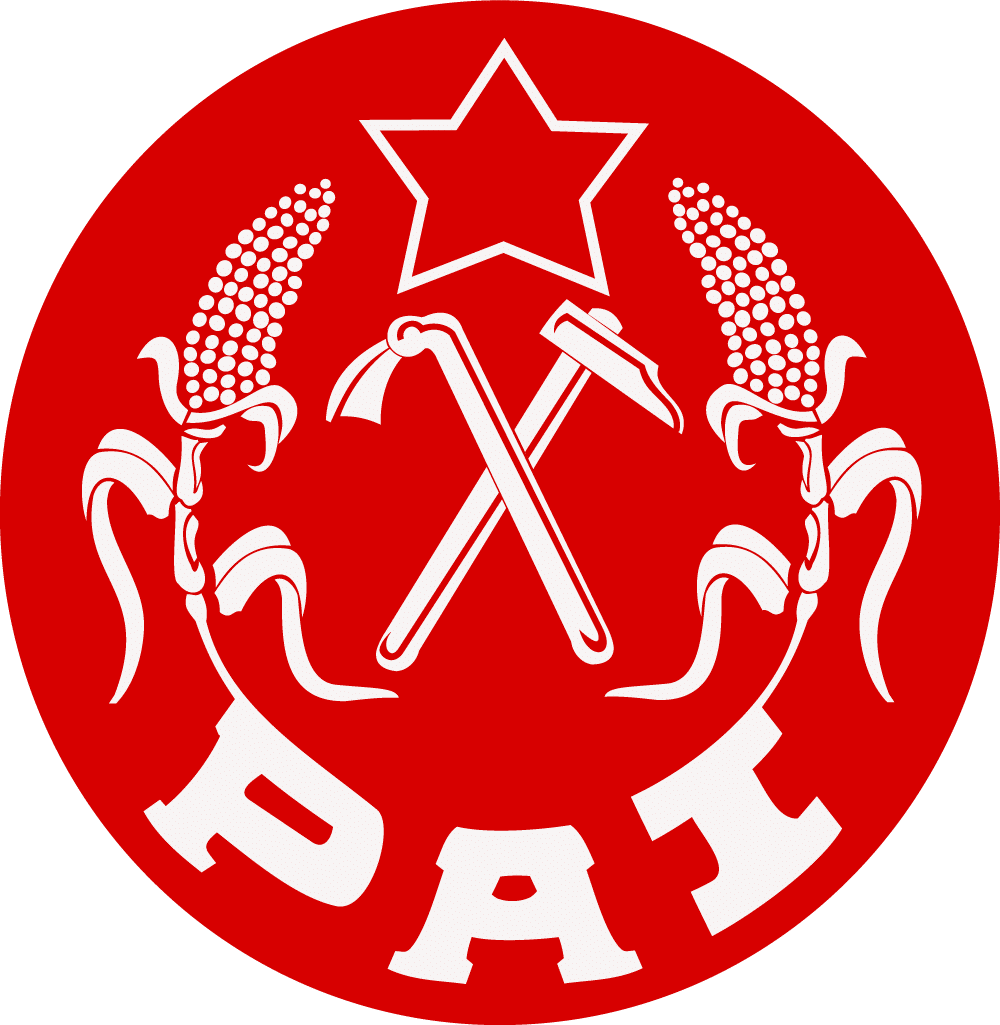Some great information and critique here. Dominant western perspectives, even when dubbing themselves “decolonial”, still paint Africa as the Dark Continent, whose inhabitants are powerless against external forces.
Instead, Vijay Prashad and Mikaela Nhondo Erskog argue, we need to center the (re-)emergence of Red Africa, the indigenous efforts towards socialism.
Concluding section
Red Africa [a recent book by Kevin Ochieng Okoth, which this article discusses at length] offers brief biographies of several pan-African Marxists, and then abruptly suggests, “It is up to us to build a communism for our times from the ruins of Red Africa.”34 What he does not provide is a map of the current struggles—led by organizations from a range of left political traditions—to build a new possibility for the African continent. These struggles emerge out of an antipathy to the colonial attitudes and structures of the Global North that define African possibilities. In the catalog of these recent atrocities stand NATO’s destructive war on Libya; the U.S. military project called AFRICOM and its number of military bases from Accra to Djibouti; the punctual French military interventions in Burkina Faso, Côte d’Ivoire, Mali, and Niger; and the use of the International Monetary Fund to force African states to submit via austerity policies and threats of default to the will of global mining companies.35 This review does not have space to chart out the entirety of the politics, but any such map would have to include the following:
Long list
The vibrancy in the Sahel (with the governments of Burkina Faso, Mali, and Niger—taking their inspiration from Sankara—driving a politics that is deeply patriotic, anti-French, and increasingly anti-imperialist). The revival of a socialist and pan-Africanist agenda through the network known as Pan-Africanism Today, with its actual network of political schools in Ghana, South Africa, and Tunisia. The emergence of the West African People’s Organisation, with a coordinating council led by Philippe Noudjenoume of the Communist Party of Benin. The struggles of a range of political forces in Sudan that led to the revolution of 2018–19, driven by the National Consensus Forces, Forces of Freedom and Change, local resistance committees, Sudanese Professionals Association, with the Sudanese Communist Party involved in almost all these mass platforms.To this review must be added new institutions that have entered the battle of ideas on the African continent:
A robust new energy in Kenya produced by the Ukombozi Library, the Organic Intellectuals Network, and Vita Books, each of them lifting up the national liberation Marxist legacy of the assassinated Pio Gama Pinto and others.36 A new generation of scholars across the continent who are attentive to the treatment of the African economy as both a crisis for the people and an opportunity for multinational firms, and who are aware of the racist and sexist concepts used to displace the centrality of the African people, have now formed at least two platforms to put forward their own agenda. First, Nawi, or Afrifem Macroeconomics Collective, gathers feminists into a network to intervene in debates around macro-economic policy, with their focus being to put at the core the labor of working women.37 Second, a collective Nawi works closely with, is the Collective on African Political Economy (CAPE), coordinated by Grieve Chelwa. In April 2023, CAPE released its opening statement, the last paragraph of which deserves to be quoted at length: CAPE is a new grouping of Africans from different walks of life that are committed to the economic, and thus total, emancipation of the African continent and the Third World more broadly. CAPE hopes to recapture the emancipatory scholarship and politics of a previous generation of intellectuals that emerged from the post-independence movement in the 1960s and reformulate it to respond to the needs of today’s world. The lessons of that generation and the institutional infrastructure that it built have been forgotten largely as a result of IMF and World Bank-inspired structural adjustment programmes (SAPs) that began in the 1980s. The SAPs are responsible for widespread destruction, including the evisceration of progressive scholarly communities in Africa and much of the Third World. It is precisely such communities that CAPE hopes to bring to life to rebuild a present, and future, that centres the needs and aspirations of the majority.38 In 2024, the centenary birth year of Cabral, the Fundacão Amílcar Cabral in Praia (Cape Verde) will hold a series of events, including the publication of several selections from Cabral. The publication of Antonio Tomás’s biography of Cabral (in 2007 in Portuguese and in 2022 in English) is a landmark event as we start to recover his full legacy.39 The establishment of the Centre Culturel Andrée Blouin in Kinshasa, Democratic Republic of the Congo (DRC), which drew in and revitalized the energies of the likes of the late Ernest Wamba-dia-Wamba, and its agenda to revive the work of Blouin—a close comrade of Patrice Lumumba—will help vitalize the Lumumbist currents within the DRC, where they are either under repression or have been incorporated into the system.40 A landmark three-volume biography of Julius Nyerere (Development as Rebellion), written by Issa Shivji, Saida Yahya-Othman, and Ng’wanza Kamata, was published in 2020 by Dar es Salaam’s classic Mkuki na Nyota Publishers, run by Walter Bgoya. Mkuki na Nyota has published Rodney’s How Europe Underdeveloped Africa, but also work by Agostinho Neto, Samora Machel, and others from Okoth’s Red Africa canon.41 Shivji, Yahya-Othman, and Bgoya emerged politically in Dar es Salaam around the circle of radicals that included Rodney. Now, they work in a context that includes Tanzania’s vibrant peasant movement Mviwata. Regarding the peasantry, theoretical work on the agrarian struggles on the African continent was advanced at the African Institute for Agrarian Studies, based in Harare, Zimbabwe, now called the Sam Moyo African Institute of Agrarian Studies after its remarkable founder, Sam Moyo, who died in 2015. The Institute created an Agrarian South Network in 2002, and then a decade later, the important journal, Agrarian South: Journal of Political Economy. The Network holds a summer school and a training institute for young scholars from across the three continents of the Global South. Such institutes grew on the soil tilled by the Council for the Development of Social Science Research in Africa, formed in 1973 by a number of intellectuals who came out of the stream of Marxism and national liberation. The council publishes over ten journals in which one can read the thinking of African scholars about African realities. The revival of the intellectual tradition and political legacy of Nkrumah has been long overdue, but welcome. Credit for this goes to the Socialist Movement of Ghana, which has been holding annual events to remember the ousting of Nkrumah on February, 24, 1966, on what they call the “Day of Shame,” and has published The Great Deception, first in 2005 and now in its fourth edition in 2024, which collects the key documents on the coup. It is through this revival that The Revolutionary Thoughts of Kwame Nkrumah has been published in collaboration by Inkani Books in South Africa and Militant Books in Ghana.42 Finally, in South Africa, Inkani Books, the new pan-Africanist publishing house, which has released volumes that select the work of Sankara and Cabral and the first Zulu translation of Fanon’s Wretched of the Earth (Izimpabanga Zomhlaba). Rooted at The Commune Bookshop in Johannesburg, South Africa, Inkani Books has an ambition, through the African Union of Left Publishers, to energize the publication of left books on the African continent.This list of movements and institutions involved in the battle of ideas on the African continent is merely indicative. They constitute a part of the actual world of Red Africa that Okoth gestures toward. There is soberness here, but also a sensibility that says more organizations need to be built, more mass platforms need to be developed, and more theories, programs, and strategies need to be debated.

